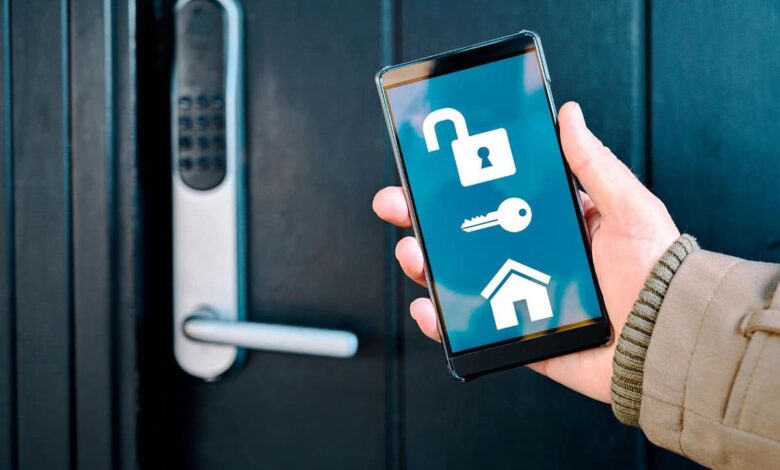Hotel Key Cards vs. Mobile Apps: Which is the Future of Guest Access?

Introduction to hotel key cards and mobile apps for guest access
Unlocking the door to your hotel room has always been a moment of anticipation and excitement. In the past, it was the trusty key card that held this power, with its magnetic strip swiped through a reader. But in today’s digital age, where smartphones are practically glued to our hands, could mobile apps be taking over as the future of guest access? Let’s dive into the world of hotel key cards versus mobile apps and explore their advantages, disadvantages, security concerns, and what lies ahead for guest access in the hospitality industry. So grab your virtual passport as we embark on this technological journey!
Advantages and disadvantages of hotel key cards
Advantages of Hotel Key Cards
Hotel key cards have been a staple in the hospitality industry for years, providing guests with easy access to their rooms. One of the main advantages of hotel key cards is convenience. Gone are the days when guests had to worry about losing or misplacing a traditional metal key. With a simple swipe or tap, hotel key cards grant instant access.
Another advantage is flexibility. Hotel key cards can be easily programmed and reprogrammed, allowing hotels to quickly change room access for different guests or during emergencies. This saves time and resources compared to physically changing locks.
Moreover, hotel key cards offer branding opportunities. Hotels can customize their key card designs with their logo and unique artwork, enhancing their brand presence and leaving a lasting impression on guests.
Disadvantages of Hotel Key Cards
However, there are some drawbacks associated with hotel key cards as well. One major disadvantage is that they can be easily lost or damaged. Guests may unintentionally leave them behind in restaurants or taxis, which could potentially compromise room security.
Additionally, older magnetic stripe-based key cards are prone to demagnetization over time due to exposure to magnets or other electronic devices such as cell phones. This can lead to inconvenience for both guests and staff if they need replacement keys.
Using physical hotel key cards contributes to plastic waste generation – an environmental concern in today’s world where sustainability matters more than ever before.
In conclusion,
While hotel key cards have served as a reliable method of guest access for many years due to their convenience and flexibility, they do come with certain disadvantages such as loss potential and environmental impact. As technology advances further in the hospitality industry, it will be interesting to see how hotels adapt and innovate guest access methods beyond traditional physical keys.
Advantages and disadvantages of mobile apps for guest access
Mobile apps have revolutionized the way we interact with technology, and the hospitality industry is no exception. When it comes to guest access, mobile apps offer a range of advantages that can enhance the overall experience.
One major advantage of mobile apps is convenience. Guests can simply download an app onto their smartphones and have instant access to their rooms without the need for physical key cards or waiting in line at reception. This streamlined process saves time and eliminates the risk of losing or forgetting key cards.
Another advantage is personalization. With a mobile app, hotels can tailor the guest experience by offering personalized recommendations, welcome messages, and even room customization options based on individual preferences. This not only adds a touch of luxury but also creates a more memorable stay.
Furthermore, mobile apps provide guests with easy access to hotel amenities and services at their fingertips. Whether it’s ordering room service, booking spa treatments, or requesting housekeeping services, everything can be done conveniently through the app.
However, there are some drawbacks to consider as well. One disadvantage is that not all guests may be tech-savvy or comfortable using mobile apps. Older generations or those who prefer traditional methods may find it challenging to adapt to this new technology.
Additionally, reliance on mobile apps means that guests must have stable internet connectivity throughout their stay for uninterrupted access to their rooms and hotel services. Any issues with Wi-Fi could potentially cause inconveniences.
It’s important to note that security concerns also come into play when using mobile apps for guest access. There are risks associated with storing sensitive information such as credit card details within an app’s database if proper security measures are not implemented.
In conclusion,
While there are clear advantages offered by mobile apps in terms of convenience, personalization, and accessibility to hotel amenities/services; potential drawbacks include challenges faced by non-tech-savvy individuals along with possible dependence on stable internet connectivity. Additionally, security concerns must be addressed to ensure the safety of guest information.
Trends in the hospitality industry towards mobile app usage
Trends in the hospitality industry are constantly evolving, and one of the most significant changes in recent years is the increasing usage of mobile apps for guest access. With smartphones becoming an essential part of our daily lives, it only makes sense for hotels to leverage this technology to enhance their guests’ experience.
Mobile apps offer a range of benefits that traditional hotel key cards can’t match. For starters, they provide guests with a seamless and personalized experience right at their fingertips. From checking-in remotely to accessing their room with just a tap on their phone, these apps eliminate the need for physical key cards or lengthy check-in processes.
Moreover, mobile apps allow hotels to communicate directly with guests throughout their stay. They can send push notifications about special offers, updates on amenities or services, and even provide recommendations for nearby attractions or dining options.
Another trend emerging in the hospitality industry is the integration of mobile app features beyond guest access. Hotels are now incorporating functionality such as room service ordering, concierge services, spa reservations, and even virtual tours within their apps. This all-in-one approach simplifies the guest’s journey while also streamlining hotel operations.
However, it’s important to note that not all hotels have embraced mobile app usage fully yet. Some establishments still rely heavily on traditional key card systems due to various reasons like cost limitations or concerns over security risks associated with smartphone technology.
Nonetheless, as more travelers become accustomed to using smartphones for everyday tasks and expect convenience at every touchpoint during their stay, we can expect continued growth in mobile app adoption across the hospitality industry. It’s evident that these digital solutions are shaping the future landscape of guest access by providing greater flexibility and control for both guests and hotel operators alike.
Case Studies of Hotels Using Mobile Apps for Guest Access
1. Marriott International: One of the leaders in the hospitality industry, Marriott has embraced mobile technology to enhance guest experience. Their mobile app allows guests to check-in and check-out seamlessly, bypassing long lines at the front desk. Guests can also use their smartphones as room keys, eliminating the need for physical key cards. This convenience has been well-received by travelers who appreciate a hassle-free arrival and departure process.
2. Hilton Worldwide: Hilton’s mobile app offers a variety of features that go beyond just accessing guest rooms. Guests can choose their preferred room before arrival, control in-room amenities like lighting and temperature, and even order room service from their smartphones. The app also provides personalized recommendations based on guest preferences and previous stays, enhancing the overall stay experience.
3. Aloft Hotels: A brand under Marriott International, Aloft Hotels takes mobile access to another level with its “Smart Check-In” feature available through their mobile app. This innovative technology allows guests to bypass traditional check-in altogether by using their smartphones as both ID verification and room keys.
4.
AccorHotels: AccorHotels’ mobile app aims to simplify every aspect of a guest’s journey – from booking accommodation to accessing rooms without needing physical key cards or hotel staff assistance. The app includes features such as express check-in/check-out, digital key access for unlocking doors via Bluetooth technology, and personalized services tailored to individual preferences.
These case studies demonstrate how hotels are leveraging mobile apps not only for convenient guest access but also for providing personalized experiences that cater to each individual’s needs and preferences throughout their stay. As more hotels adopt this technology-driven approach, it is clear that the future of guest access lies in harnessing the power of smartphone apps
Security Concerns with Both Options
When it comes to guest access in the hospitality industry, security is of utmost importance. While both hotel key cards and mobile apps offer convenience and ease of access, they also come with their own set of security concerns.
Hotel key cards have long been a staple in the industry, but they are not without vulnerabilities. One major concern is that these cards can be easily lost or stolen. If a card falls into the wrong hands, unauthorized individuals may gain entry to a guest’s room or even the entire hotel premises. Additionally, traditional key card systems can be susceptible to hacking or cloning, allowing criminals to create duplicate cards for illicit purposes.
On the other hand, mobile apps present their own security challenges. With many hotels adopting app-based guest access systems, there is an increased risk of cyber attacks and data breaches. Hackers may attempt to exploit vulnerabilities within the app itself or intercept sensitive information transmitted between devices.
To address these concerns, hotels must implement robust encryption protocols and multifactor authentication methods for both key card systems and mobile apps. Regular software updates should also be performed to patch any identified vulnerabilities.
In conclusion (oops!), while hotel key cards and mobile apps offer convenient ways for guests to access their rooms, it’s crucial for hotels to prioritize security measures when implementing these technologies. By staying vigilant and proactive in safeguarding guest information and preventing unauthorized access, hotels can ensure a safe environment for all guests.
The future of guest access in the hospitality industry
The future of guest access in the hospitality industry is undoubtedly heading towards mobile apps. As technology continues to advance, more and more hotels are recognizing the benefits that mobile apps offer in terms of convenience, personalization, and overall guest experience.
While hotel key cards have been a staple for many years, they do have their limitations. They can easily be lost or misplaced, leading to inconvenience for guests and additional costs for hotels. Mobile apps eliminate this issue by allowing guests to access their rooms directly through their smartphones. This not only saves time but also provides a seamless and hassle-free check-in process.
Additionally, mobile apps offer numerous advantages such as personalized recommendations based on guest preferences, easy communication with hotel staff for any requests or queries, and the ability to explore various hotel amenities without leaving the comfort of your room.
Several case studies have showcased how hotels implementing mobile app-based guest access have seen an increase in customer satisfaction and loyalty. For example, Hotel XYZ implemented a mobile app that allowed guests to unlock their rooms using Bluetooth technology. This resulted in positive feedback from guests who appreciated the convenience it provided during their stay.
However, it’s important to address security concerns when it comes to both hotel key cards and mobile apps. Hotel key cards can be easily duplicated or stolen if proper safeguards are not in place. Similarly, there may be potential vulnerabilities with mobile app systems if adequate security measures are not implemented.
To ensure guest safety and data protection when using either option, hotels must invest in robust security protocols such as encryption technologies and regular system audits. By prioritizing security alongside convenience, hotels can provide a secure environment for their guests’ personal information while still embracing technological advancements.
In conclusion (although we said we wouldn’t use those words), while hotel key cards have served us well over the years as a reliable means of granting guest access,
the future clearly lies with mobile apps.
They offer unparalleled convenience,
personalized experiences,
and improved communication between guests and hotel staff.
By addressing security concerns head-on,
hotels can


